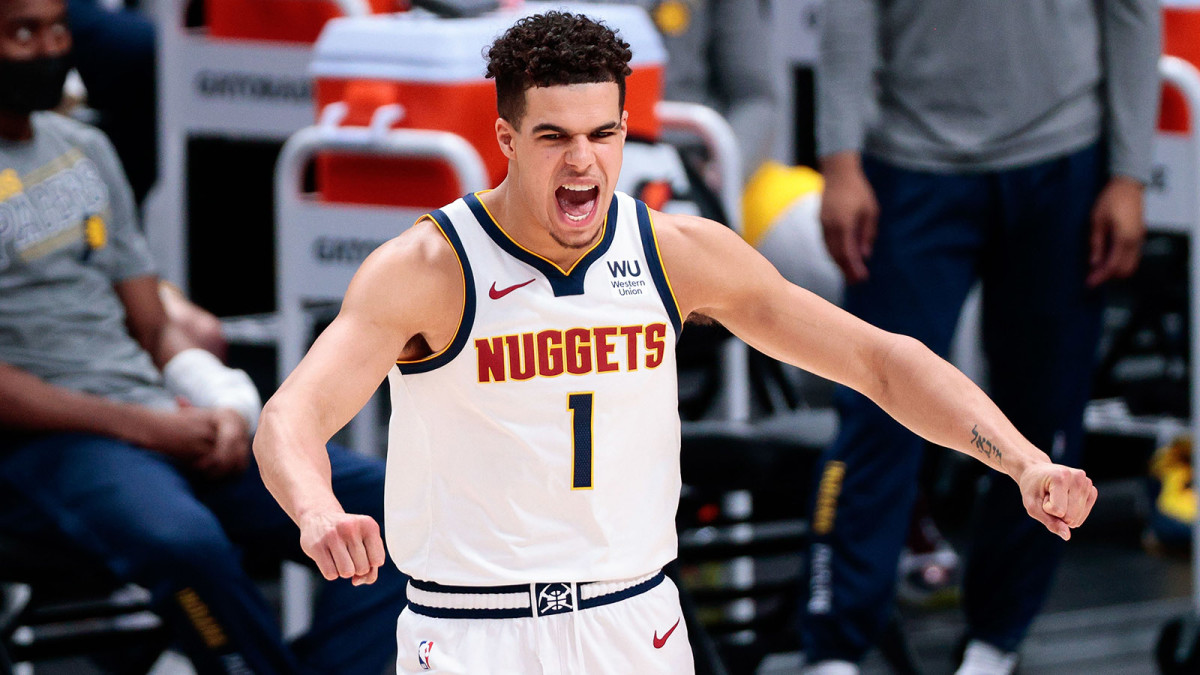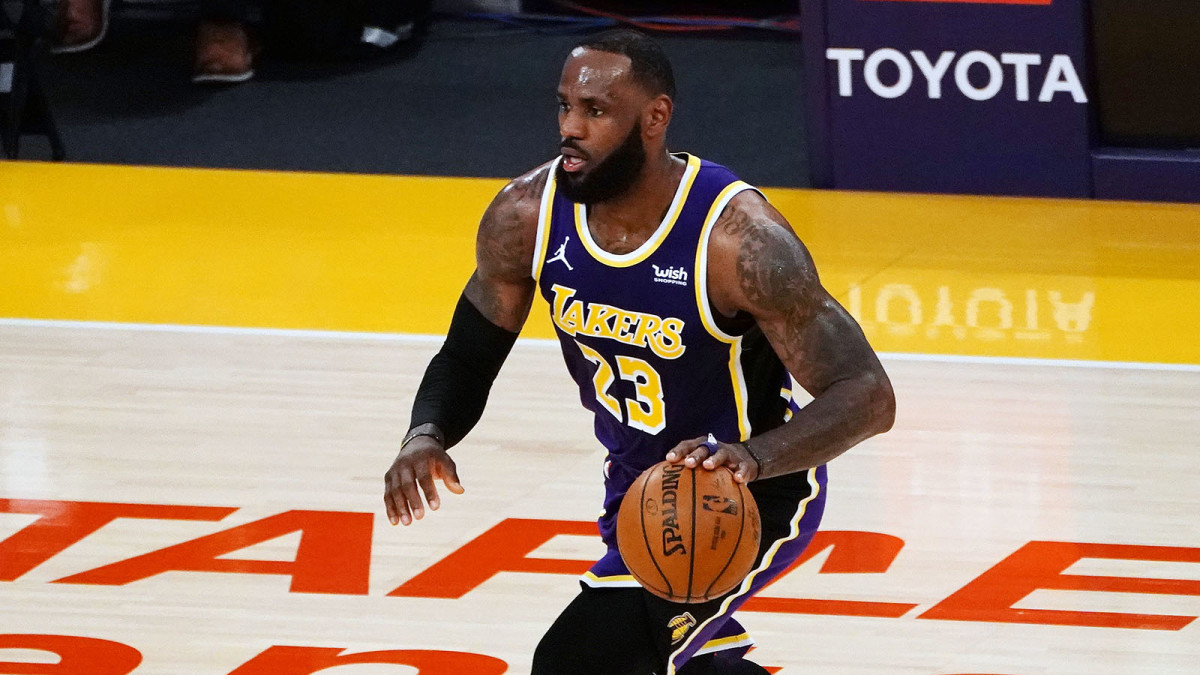The Nuggets Have Stumbled Into Their Lineup of the Future

Welcome to the Morning Shootaround, where every weekday you’ll get a fresh, topical column from one of SI.com’s NBA writers: Howard Beck on Mondays, Chris Mannix on Tuesdays, Michael Pina on Wednesdays, Chris Herring on Thursdays and Rohan Nadkarni on Fridays.
Michael Porter Jr. can be one of the most frustrating players in the NBA. One moment he’s pulling up for a contested jumper that perfectly slithers through the net. The next, he’s completely lost on defense and his teammates are throwing their hands up in frustration. It’s that inconsistency that often had Porter out of the Nuggets’ rotation for chunks of last season. This year however, particularly after an injury to veteran stalwart Paul Millsap, MPJ seems to have finally found his proper role within Denver’s ecosystem. And with that development, the Nuggets may have finally cracked the code to unlocking their roster’s full potential.
After an injury to Millsap on Valentine’s Day, and then some up-and-down play, Michael Malone started Porter Jr. at power forward on Feb. 23, alongside Jamal Murray and Monte Morris in the backcourt, as well as Nikola Jokic and Will Barton in the front. The Nuggets went 6–1 with that group starting before Millsap’s return after the All-Star break, the only loss coming by two points. Denver has only three high-usage lineups this season (units that have played at least 100 minutes together.) And the MPJ-Jokic-Murray-Morris-Barton group is by far the best—posting a 23.6 net rating in 151 minutes, including a shocking 101.9 defensive rating. (The other two lineups in that cohort—both with Porter Jr. playing small forward—have defensive efficiencies of 112.8 and 111.6)
Simply put, playing Porter Jr. at power forward has been a massive boon for the Nuggets. Consider this: The MPJ-Murray-Jokic trio has a 18.0 net rating when sharing the floor without Millsap—a great sign for the long-term success of these young talents. Add Millsap to the mix, and that figure drops to 10.2, and the defense goes from stingy to grandma-on-Thanksgiving levels of generous. Overall, Millsap and Porter Jr. have played together for 278 minutes this season, and Denver has a 2.8 net rating in that time.
It makes sense why the Porter Jr.-Millsap forward pairing doesn’t quite work. Defensively, neither currently has the footspeed to chase around athletic wings. Porter Jr. isn’t a great defender, but he has a better chance competing against nominal power forwards than he does against perimeter players who handle the ball often. Millsap, who has long been a great team defender, is 36 years old and has some injuries under his belt, so he’s probably more suited to banging with centers than guarding stretchy fours. For a team that never struggles with offense but often couldn’t slow down a sloth, finding a lineup configuration that allows Porter Jr. to survive defensively is imperative to Denver’s title aspirations. Offensively, the spacing is much cleaner when Millsap and Porter Jr. aren’t on at the same time.
Since the second game after the All-Star break, an injury to Morris has put Millsap back into the starting lineup—for now. The vet told Malone he would be willing to come off the bench, and his coach has hinted he will return to the MPJ-at-four lineup once Morris is healthy. This is no small order. Moving proud veterans to the bench isn’t as simple as it is during the 2K loading screen.
In some ways, Millsap legitimized the Nuggets when he signed with the team as a free agent in 2017. Coming off a celebrated run with the Hawks that included four All-Star appearances, luring Millsap was a huge win for Denver’s front office. And Millsap himself said he signed with the team because he wanted to play alongside Jokic. In four seasons in Denver, Millsap has only come off the bench 10 times total. Malone has been fiercely loyal to Millsap, and maybe wouldn’t be considering putting him on the bench if not for the overwhelming success of the new group in his absence.
Yet MPJ at the four is hugely important on multiple levels. First, it works on the court. Secondly, it may help to clarify whether or not he should be included in a possible trade. It’s no secret that Porter Jr. is the Nuggets’ best chip if they want to go star hunting. But if he’s thriving alongside the building blocks Jokic and Murray, then the front office would likely be less inclined to deal him. And if the current configuration has legs, it should make it more clear how to build around the emerging trio moving forward.

A potential playoff rotation looks much clearer with MPJ playing power forward. Millsap can come off the bench as the backup five, with JaMychal Green—who’s been great for Denver—spelling Porter Jr. at the four. Gary Harris can still be useful as a 3ish-and-D guy in the backcourt even if his offense has been largely zapped by injuries. That would give Denver eight players who can theoretically survive on the floor in huge moments, when the flaws or inexperience of some of the current subs could become crippling.
Of course, the Nuggets didn’t become a perfect team with this one lineup change. The sample size of the Murray-Morris-Barton-Porter Jr.-Jokic fivesome is still relatively small. And Barton, though competitive, isn’t a shutdown defender and lacks the size to go up against some of the stars at his position. If the Nuggets are willing to gamble on some of their current fringier rotation guys to step up, they can try to package Harris and Barton for one more impact player. (Kyle Lowry?) If not a big name, even just putting a 6’ 8”, slightly above-average shooter who can defend in Barton’s slot could eventually pay big dividends for the Nuggets with Porter Jr. at home next to Jokic.
MPJ is still going to frustrate. He’s 22 years old and has only appeared in 85 NBA games. But the ups-and-downs that define his career so far seem to finally be trending in the right direction.
LeBron’s MVP Grudge(s)

Late Thursday night, LeBron James really began his 2021 MVP campaign in earnest, lamenting the fact he has only four MVPs.
“I should have more than four, I believe,” James said. “I don't sit around thinking about it or crying about it, or whatever the case may be. I just try to come in the next season and be the MVP and be talked about it again. I bet a lot of the greatest that played this game feel like they should have more as well, if you ask any one of those guys.”
Kyle Kuzma and Frank Vogel also helped get the message out, with both essentially saying LeBron should have more MVPs considering how long he’s been the best player in the league.
Personally, I think James should have five MVPs. He was robbed in 2011, when voters picked Derrick Rose, which you’ll never convince me wasn’t on some level the result of the spite directed at James in the wake of The Decision. (LeBron averaged 27, 7.5, and 7 that year. Rose averaged 25, 4, and 7.7.)
Since his last MVP in 2013, I don’t think James was unfairly treated in any of the years following. Kevin Durant was spectacular in 2014. Stephen Curry took the Warriors to new heights in 2015 and 2016 while single-handedly changing the style of NBA play. Kawhi, Russ, and Harden all had better cases in 2017, and the 2018 Cavs just weren’t very good. LeBron’s best argument is the 2020 season, and he made his thoughts clear about Giannis winning the award while in the bubble. I think if the regular season hadn’t been cut short, LeBron could have caught Antetokounmpo in the race.
What I really want to hear from James though is the years he feels he should have won. He hasn’t been afraid to call out awards in the past. (Ask his teammate Marc Gasol about his 2013 Defensive Player of the Year trophy.) LeBron, we all know you have an incredible photographic memory, so please lay out the case for each additional year you think you should have won. I’m open to being convinced, but more than anything, I would love to hear from James himself why he thinks he was better than someone in a given year. Too many times we hear players say they don’t play for individual awards. It’s refreshing when someone readily admits they care.
More Morning Shootaround
Herring: Inside the NBA's year of the lefty
Pina: Dončić is finding his rhythm behind the three-point line
Mannix: 10 story lines to follow ahead of trade deadline
Beck: Breaking down Webber's Hall of Fame case
Nadkarni: Butler has put Heat on his back
